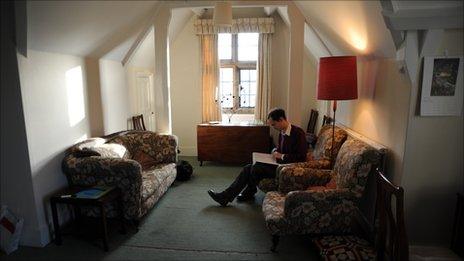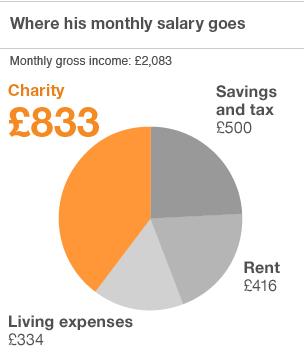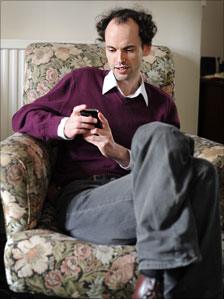Toby Ord: Why I'm giving £1m to charity
- Published

Toby Ord is a university researcher earning not much more than the average salary. So why is he giving away £1m over his lifetime to help address global poverty?
When Facebook founder and billionaire Mark Zuckerberg pledged to give away most of his wealth during his lifetime, some British commentators bemoaned the lack of philanthropy on this side of the Atlantic.
But an academic at Oxford University is living off little more than £300 a month in an act of charity-giving that is arguably more impressive than those of Zuckerberg, Gates, Buffett and co.
Toby Ord, 31, has in the past year given more than a third of his earnings, £10,000, to charities working in the poorest countries. He also gave away £15,000 of savings, as the start of his pledge to give away £1m over his lifetime.
And he's started a campaign to recruit, Bill Gates-style, other people to give up at least 10% of their lifetime's earnings in the same way. A year on, 64 people have joined his movement Giving What We Can, external and pledged £14m.
Given his personal sacrifice, it's difficult not to feel rather intrigued about the kind of lifestyle he can maintain while so much of his earnings is going elsewhere.
And heading to Oxford to find out, there's a fleeting thought that we'll be sharing tea bags in a caravan parked on the banks of the Thames.
Instead, the Ord household inhabits a rented one-bedroom flat in a beautiful sandstone house in the heart of the city. But the interior is as modest as the exterior is glorious, furnished sparingly in a style reminiscent of student digs. There is no television, through choice rather than hardship, but plenty of books and DVDs.
The only signs of indulgence are the two Mac computers, for Ord and his wife, although as he points out, they are used so much that the cost works out at a few pence per hour. And he has an iPhone, which also helps him work.
Giving away a tenth of one's earnings is something most people in the UK can achieve without having to make much of a sacrifice, says Ord, who was born and raised in Melbourne, Australia.

"That's probably surprising because if you did a survey of 100 people, 99 would say they couldn't.
"When I was earning £14,000 as a student, I found I was in the richest 4% in the world, even adjusting for how much further money goes in developing countries.
"Giving away 10% of that, I found that I would still be in the top 5%. So while it can seem impossible to live on less, if your employer was to suddenly pay you less, you would get by somehow."
Ord gives away much more than a tenth. A year ago, he vowed to give away everything he earned above £20,000 and his wife, Bernadette Young, a medical doctor in the NHS, set a target of £25,000. After his first year, he has lowered his personal allowance to £18,000.
Ultimately, there weren't any big sacrifices, he says, and they still maintain a reasonable middle-class existence.
"What's really important in our lives is spending time together, chatting with our close friends and reading beautiful books and listening to beautiful music, and we're really lucky to live in a beautiful place and there are lots of stimulating cultural activities around. With all that you can't really ask for much more.
"I've also changed the way I look at the world. I don't want more stuff. If someone said to me 'Here's one thousand pounds' and I had to spend it on myself I would feel anxious about that because I just want to help people more and it would be a very frustrating time."

Ord lives in a rented flat in Oxford
He goes out for dinner about once a fortnight and for coffee about once a week. In the past year he spent £5,000 on rent to his employer and landlord, Balliol College. His wife pays the same amount. He kept £4,000 to live on and pay the bills, while still having enough to spend on a week's holiday in France and Italy, and put some away to buy a house.
Incidentally, in 10 years, Ord and his wife, who have no children, will have given away a sum that equals the average price of a house in the UK, just at a time when they will hope to have bought one themselves.
"When it began, I would be down in the supermarket agonising about whether to buy a more expensive cereal or not but I realise that's a road to a nervous breakdown and that it was much more sensible to work out at the start what you can live on [give away the rest in a lump sum] and then after a year readjust - can I live on less, am I pushing it too hard - instead of perpetually agonising about it."
It was while he was studying for a masters degree in philosophy that Ord came across the idea of sacrificing luxuries in order to save a life. He estimated that over his own lifetime he would need about £500,000 to live comfortably, and would therefore be able to give away £1m to those people in most need. But who are they?
"Some people think that the most important thing is to help the people who are the worst off. I think that's not always the case. What's really important is to help people as well as you can and often the people the worst off are easier to help, but not always.
"For example, someone in the UK suffering from severe depression has possibly a worse life than people I help in Africa or South Asia but it turns out that it's really difficult to help that person, but much easier to help the person abroad.
"I'm not as focused on where people are, as how much I can help them. A lot of people can switch off when they hear 'cost-effectiveness' but if you only have a certain amount of money then the real question is how much you can do with it."
Using the methodology of the World Health Organisation, external in calculating how much a sum of money can "buy" in terms of extending the lives of those in need, he says medical interventions in developing countries can be 10,000 times more cost-effective than those in the UK. And he carefully researches which charities he thinks make the most difference.

Giving away a third of your income doesn't preclude the odd luxury
The £10,000 he gave away last year he says equates to 4,000 extra years of life at full health for people in those countries where those charities do their work.
That's all very well and to be applauded but wouldn't it be, well, more British, to do this quietly? Not if you want to encourage others to do the same, says Ord.
"It's not that amazing. I'm not that impressed by this, but I'm glad that people feel it's a good story. The median income is £18,000 so I'm not living off anything less than the median person in the UK.
"It's quite possible to present this as a very positive thing. You can help people so much without impacting on your own life. We can still live a middle-class life on this kind of money."
He's aware of the arguments people have against giving to charities in the developing world, such as corruption and overpopulation, and he sets out to address them on a section of his website, external.
Echoing the philosophy of Bill Gates, who believes going public encourages other people into acts of generosity, Ord set up Giving What We Can to share ideas about "good" charities and inspire each other. The figure of a tenth originates from the Christian tithes, a tradition that many people still follow today.
Some of his members give more away than that, but Ord insists he never makes those that don't feel guilty about it.
"There is a strong moral obligation to give some away but I wouldn't like to say how much. We're not saying that if you don't join up you're a bad person.
Oxford academic Toby Ord on giving his money to charity
"There used to be conflict between what I wanted and what I thought was right and that was frustrating, but over time it was just what I thought was right."
He used to feel guilty seeing poverty on television but giving away part of his wealth has liberated him, and he says it gives meaning to his life.
"I've made some simple material sacrifices but sufficiently small that I don't really care about them. In terms of emotional comfort, you feel more satisfied with what you're doing with your life."
The promise of a warm glow inside, no matter how many lives saved, may be a hard sell at a time of such belt-tightening and cuts, but Ord responds that the UK remains a very wealthy country, compared with many others.
And his own budget-trimming doesn't extend to Christmas spending. He did his shopping early and posted the presents to relatives in Australia, which he plans to visit next year.
A far greater gift awaits thousands of others.